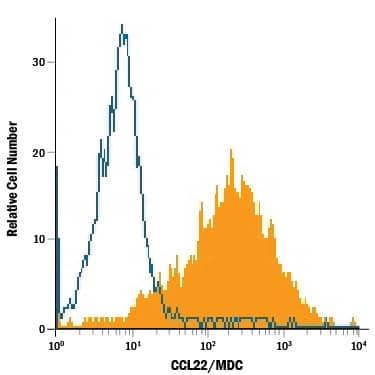Human CCL22/MDC Antibody
R&D Systems, part of Bio-Techne | Catalog # MAB3361


Key Product Details
Species Reactivity
Applications
Label
Antibody Source
Product Specifications
Immunogen
Gly25-Gln93
Accession # O00626.1
Specificity
Clonality
Host
Isotype
Scientific Data Images for Human CCL22/MDC Antibody
Detection of CCL22/MDC in Human Mature Dendritic Cells by Flow Cytometry.
Human mature dendritic cells were stained with Mouse Anti-Human CCL22/MDC Monoclonal Antibody (Catalog # MAB3361, filled histogram) or isotype control antibody (Catalog # MAB0041, open histogram), followed by Phycoerythrin-conjugated Anti-Mouse IgG Secondary Antibody (Catalog # F0102B). To facilitate intracellular staining, cells were fixed with paraformaldehyde and permeabilized with saponin.Applications for Human CCL22/MDC Antibody
CyTOF-ready
Intracellular Staining by Flow Cytometry
Sample: Human mature dendritic cells fixed with paraformaldehyde and permeabilized with saponin
Western Blot
Sample: Recombinant Human CCL22/MDC (Catalog # 336-MD) under non-reducing conditions only
Formulation, Preparation, and Storage
Purification
Reconstitution
Formulation
Shipping
Stability & Storage
- 12 months from date of receipt, -20 to -70 °C as supplied.
- 1 month, 2 to 8 °C under sterile conditions after reconstitution.
- 6 months, -20 to -70 °C under sterile conditions after reconstitution.
Background: CCL22/MDC
CCL22, also known as Stimulated T cell Chemotactic Protein (STCP-1), is a CC chemokine initially isolated from clones of monocyte-derived macrophages. Human CCL22 cDNA encodes a precursor protein of 93 amino acid residues with a 24 amino acid residue predicted signal peptide that is cleaved to yield a 69 amino acid residue mature 8 kDa protein. At the amino acid sequence level, CCL22 shows less than 35% identity to other CC chemokine family members. Human CCL22 is expressed in dendritic cells, macrophages and activated monocytes. In addition, CCL22 expression is also detected in the tissues of thymus, lymph node and appendix. The gene for human CCL22 has been mapped to chromosome 16 rather than chromosome 17 where the genes for many human CC chemokines are clustered. Recombinant or chemically synthesized mature CCL22 has been shown to induce chemotaxis or Ca2+ mobilization in dendritic cells, IL-2 activated NK cells, and activated T lymphocytes. A CD8+ T lymphocyte-derived secreted soluble activity that suppresses infection by primary non-syncytium-inducing and syncytium-inducing HIV-1 isolates and the T-cell line-adapted isolate HIV-1IIIB, has been identified as CCL22. Based on amino-terminal sequence analysis, the major CD8+ T lymphocyte-derived CCL22 protein yielded an amino-terminal sequence of YGANM, which is two amino acid residues shorter than the predicted mature CCL22. The difference in potency between the two mature CCL22 isoforms has not been determined.
References
- Godiska, R. et al. (1997) J. Exp. Med. 185:1595.
- Chang, M-S. et al. (1997) J. Biol. Chem. 272:25229.
- Pal, R. et al. (1997) Science 278:5338.
Alternate Names
Gene Symbol
UniProt
Additional CCL22/MDC Products
Product Documents for Human CCL22/MDC Antibody
Product Specific Notices for Human CCL22/MDC Antibody
For research use only